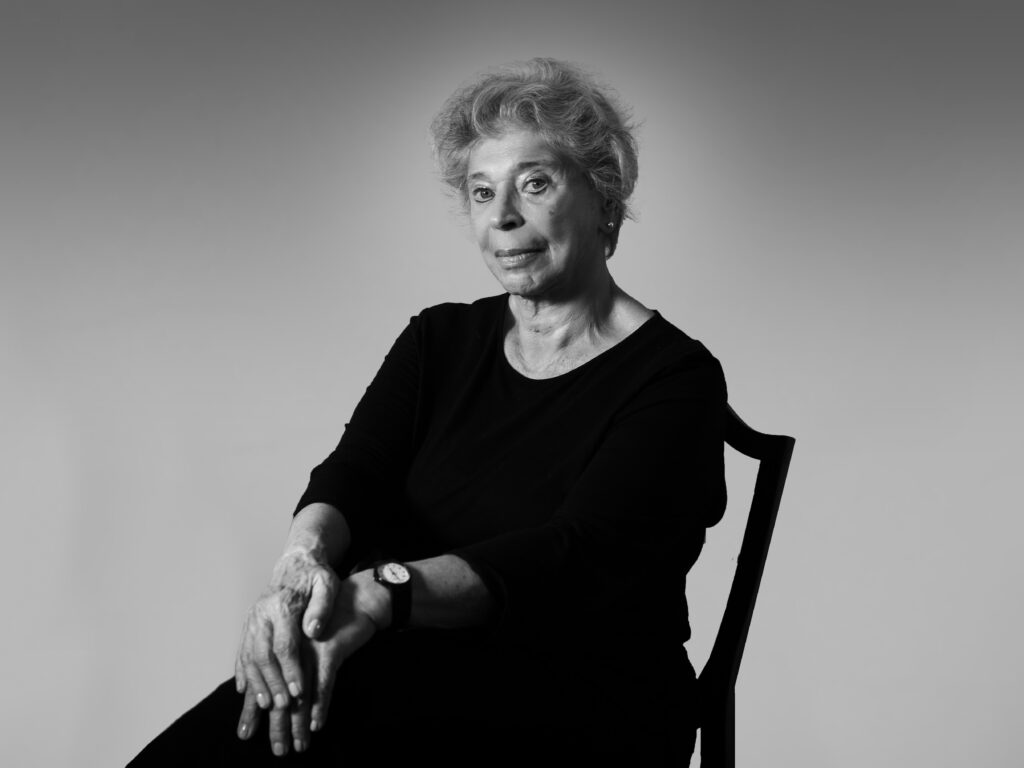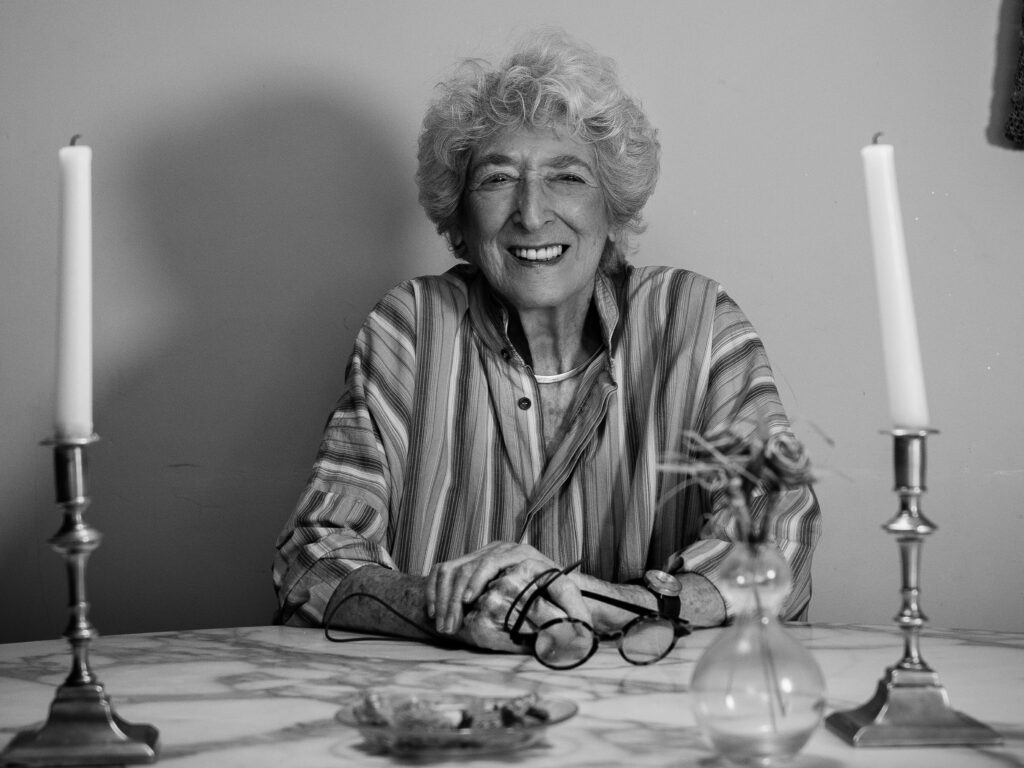In August 2019, Nora Eisenberg, a novelist who lives part of the year in Narrowsburg, stopped by our bookshop, One Grand Books, and suggested we host an event with Lore Segal, who was visiting her that summer. Segal had just published The Journal I Did Not Keep, a collection of new and collected writing that offered, in the words of The New York Times, a “sampler… of some of the best fiction and essays in American literature.” Segal, a finalist for The Pulitzer Prize in 2008 for her collection of 13 interlinked stories, Shakespeare’s Kitchen, was 91 at the time, and still writing. I had never heard of her. And then I read her work and was smitten. It was funny, it was wry, it was subtle. It turns out she is not dissimilar. In Narrowsburg she delighted an audience of book lovers surprised by our collective good fortune of having a literary star in our tiny town (population: 500).
Not long after Nora introduced me to Lore, she alerted me to another literary guest: Vivian Gornick, the author of 15 books of non-fiction, including her memoir, Fierce Attachments, which sits atop The New York Times’ list of the 50 Best Memoirs of the past 50 years (“There’s a clarity to this memoir that’s so brilliant it’s unsettling” wrote Jennifer Szalai—which was no exaggeration). Gornick, too, read for audience barely able to contain its glee at having a literary superstar visit a one stoplight town. It turns out that Lore and Vivian had spent other summers in Narrowsburg as guests of Nora. Their friendship felt like a good foundation for bringing them together for a conversation on friendship, the human theater of the street, and why the novel has been so diminished by the 20th century.
GRAND: I want to start with something Vivian wrote for The New Yorker in 1996 in which she described New York as “the landscape of marginal encounters.” Obviously, your friendship has evolved beyond a marginal encounter. How did you first meet?
LORE SEGAL: Vivian and I knew each other for decades before we became friends. Vivian, at whose party did we meet, remind me?
VIVIAN GORNICK: George Johnson.
SEGAL: At George Johnson’s book party. It turned out that we were both walking east, and we argued, and the argument was on the subject of equality. Vivian said something along the lines of equality is the most important thing, and I said, “I can think of more important things,” and Vivian said, “like what?” I don’t remember what the answer was, but I think I said something along the lines of empathy and imagination. And, from then on we have never quite stopped talking and arguing.
GORNICK: That’s absolutely correct. I was writing a biography of Elizabeth Peyton Stanton, and Lore said, “What exactly is this feminism that you’re so enamored of?”, so I told her, and among the things that I said meant the most to me was the struggle for equality, which I felt was the most important thing in life—more than liberty, more than anything else. I felt life is bearable if there is equality. Lore said, “absolutely not,” and as she said, we’ve spent the last 20 years, not just arguing, but enjoying the argument immensely, and becoming closer and closer friends—not on the basis of our arguments, on the contrary: on the basis of that level of shared sensibility.
NORA EISENBERG: I witnessed this sensibility when for two years they visited [my home in] Narrowsburg, and we often had dinner together and there was a lot—a lot—of arguing, and laughter, and deep, meaningful conversations. But the most remarkable thing for me was going over to the house in the morning and seeing these two women at far ends of the dining room table, at their computers, writing—every morning. I wish I’d taken a photograph. It was amazing because I wasn’t writing so I was delighted but also tormented.
GORNICK: It was wonderful being in Narrowsburg.
SEGAL: Nora, I love your big white room which has a glass wall out of which you can see everything green, and there is water there that is sometimes like a river, sometimes like a lake, and very often deer walking by.
GORNICK: Nora and I know each other because in the late 1990s, I and a whole bunch of other women tried to build a senior residence for women and men in the arts. Nora joined that effort, and in fact named the whole project—The House of Elder Artists, which became known as Thea. And we became… I don’t know, was it fast friends or slow friends?
EISENBERG: It speeded up pretty quickly. But there were so many voices there that you could hardly establish a friendship, let alone a conversation. You can imagine all these women in the room and many of them were Jewish, so there were a lot of Jewish women arguing, or making their impassioned points. It became ideological at the drop of a hat. Vera (Williams, the author of A Chair for My Mother, among other books) was part of that group, which is how I knew her. She was one of the big arguers.
SEGAL: Can I just add that one of the reasons I like Jewish arguing is that it doesn’t expect you to wait until the other person has stopped talking. You talk on top of each other, and if you are not heard you talk louder. Which suits me.
GRAND: I love that Lore and Vivian met essentially on the street, which leads to a question that Vivian talks about, and is to some extent in Lore’s work too, but the New York Street is a particular place.
GORNICK: New York is an extremely ethnic city. Once upon a time it was Irish. If you read The New Yorker 75 years ago, the whole inflection of the magazine was working class Irish, and then it changed to include and even become characterized by a Jewish inflection, but the fact is this is how it is in every great city in the world.
SEGAL: I remember traveling in China where public life and social life happens on the sidewalk, much more than it does in New York. In New York sometimes you’ll see a sign on the wall that says, “No Loitering.” That couldn’t possibly happen in India, where loitering is a way of life. You cook on the street, you talk on the street, you play games on the street.
EISENBERG: Yeah, we’re supposed to be self-contained, that’s the convention, until you want to tell someone what to do from an overheard conversation. We do all kinds of things on the street—shove a person affectionately, or grab their arm.

“I don’t think there’s ever a day in my life when I’ve not walked the streets of New York and had an encounter of some sort. Of course, that’s because I talk to everybody who talks to me, and I talk to a lot of people who don’t talk to me.”
Vivian Gornick
GORNICK: It’s human theater, and we’ve been acting out all the time. Once upon a time Paris was characterized like that, through many American writers at the turn of the 20th century. So, cities take turns, but certainly New York is primary in this regard. I don’t think there’s ever a day in my life when I’ve not walked the streets of New York and had an encounter of some sort. Of course, that’s because I talk to everybody who talks to me, and I talk to a lot of people who don’t talk to me.
SEGAL: Vivian and I have traveled together, and she’s just wonderful at connecting with people by asking a question. A question will start a conversation better than anything. Maybe it’s just to ask where’s the nearest baker.
EISENBERG: In Manhattan she talks to waiters a lot, but you’ll warm up to that Vivian. The first thing you ask is, “Where’s the menu?” But once you’ve had your coffee, and have assurances the food is coming, you have these really juicy conversations with people.
SEGAL: The other night Nora and I had dinner in a diner, and the waiter was someone I had known in another diner.
EISENBERG: That was a great homecoming, the two of them—authentically delighted to see each other. An interesting thing about diner life in Manhattan, there’s one Greek family that owns a series of diners from 14th Street up to 110th. Right where I used to live on 78th Street there was Manhattan Diner, and that moved up to 96th Street, and then at 100th Street there is Metro—
SEGAL: Which now has an outdoor area, did you know that Nora?
EISENBERG: And what’s north of that?
GORNICK: It’s not north, it’s south—it’s in the lower 90s, it’s called The City Diner. They kept all of them open except The Good Stuff, which closed, painfully—that was the biggest one, and the one they couldn’t keep going. You know why? Because the landlord refused to lower the rent during the pandemic. It was really a tragedy, that place was used morning, noon, and night. I myself felt really distressed when it closed.
SEGAL: I’m an un-diner person. I don’t understand diners.
EISENBERG. When Vivian and I meet for dinner it’s most usually at a diner.
SEGAL: I’m missing out, it’s clear.
GRAND: You all draw on your life in your work. Was that instinctive or did it evolve over time.
GORNICK: I grew up like everyone else in my generation expecting to be a great novelist, and discovered quite early in life that I just didn’t have the gift for novel-writing. Nevertheless, I always saw myself as, and wanted to be, a story-teller. And a memoir is a story. It’s not a police transcript, it’s not a psychoanalytic confession, it is a story that one is telling. One is trying to shape a piece of experience. This means that the narrator is clearly the writer, and that for me is the major difference between memoir and fiction.”
SEGAL: I began writing at the age of ten to tell my first foster parents in Liverpool who had taken me in [as a Jewish evacuee], so they certainly knew what was going on, but had no idea—and how could they—what it was like living in Vienna under Hitler. I got hold of a copybook and wrote a 36-page account of what it was like to live in Vienna. It was a terrible piece of writing. However, it was actually the beginning of Other People’s Houses, so autobiographical writing came to me by historical necessity. But let me ask you this: Jane Austen’s various heroines are not, all of them, Jane Austen. All of my women are Lore Segal in some form, and I don’t think that’s a particularly admirable thing, and most of my students write autobiographical work, so it seems to be what’s happening now. Why are we now tending to write autobiography which was not the case in the 19th century?
GORNICK: Yes, what is called autofiction is essentially the memoir clearly fictionalized. I write strictly memoir, and I call it personal narrative. The personal is the memoir, the narrative is the story. I feel obliged when I write to tell a story; I feel obliged to shape whatever it is I’m talking about into something that will sustain the narrative.
SEGAL: This was not necessarily the case with earlier storytellers, they did not have to take that auto-form, and I don’t have a clue about what changed.
GORNICK: Because modernism has run its course, and the novel as such is no longer the great thing it once was. The hunger for a sense of narrative that will deliver has transferred itself to the memoir. It doesn’t meant that the memoirs are good, necessarily, or that they deliver the goods, but the novel as such is really not a forum that delivers a depth of feeling and experience that it once did, especially through the period since the end of the Second World War, where experience was so powerful, so extreme, so unbelievable that when people tried to write novels, for instance, directly out of the Holocaust, they failed. They did not have the power of a Primo Levi, they didn’t have the power of straight memoir. And that, including the liberationist movements that followed 25 years later, put the nail in the coffin of the novel. It became an age of testimony. It doesn’t mean that good novels aren’t written, but it is not the metaphoric experience it once was. That’s where we are now. Who knows what the future holds, but I do know that’s why we are where we, and why people who think of themselves as novelists write autofiction, because they realize they can’t really imagine anything but themselves.
SEGAL: But that’s a fault on the part of the imaginer, not on the part of what there is to be imagined. The Greeks could invent ideas and creatures that could take care of the most immense events, and we are no longer able to do that, you’re quite right.

EISENBERG: I have a different point of view, but it’s much more a critique of latter-day capitalism. There were great novels that came out of World War II and Vietnam, and there was great writing about women’s lives in the ’60s and ’70s, but what happened in the 1980s, the conglomerization of publishing meant that it was no longer this respectable project by families of goodwill—the Knopfs and Simons and so on, who would accept a three percent or four percent profit. The midlist collapsed.
SEGAL: I suspect that it isn’t publishing that changed, but readership that changed. I don’t know how many people recently, including people who are novel writers, have said to me, “the novel doesn’t do it for me.” Somehow novels don’t satisfy. Whatever it is they are best at, does not satisfy the reader.
EISENBERG: I agree, but I think it was driven by the publisher’s expectations. The mid-list novel—really good writers like Lynn Sharon Schwartz—collapsed. The publishers weren’t looking for it, so the sensibility collapsed in the marketplace.
GORNICK: You’re ignoring the digital revolution and the collapse of book culture. The publishers don’t make anything happen, the publishers run after what’s happening.
SEGAL: That’s what I was trying to say.
GRAND: Vivian, I wonder if writers like Nora are challenged by what has become a very literally-minded readership. Does that cause problems for writers of pure fiction?
EISENBERG: It’s also partly about the collapse of liberal arts, campuses are being decimated, history departments are collapsing.
SEGAL: We’re going to the dogs, oh dear!
GORNICK: How about the questions come down a notch or so.
GRAND: I wonder how New York today may compare to the ‘70s which was a key decade for all of you.
GORNICK: Each of us in our own way found a place in a world that was, indeed, richly endowed by book culture. In the 1970s it was like it was in the 1950s. You could read the New York Times book review and the reviews were by people like Alfred Kazin and Irving Howe and Elizabeth Hardwick, and today—well, I don’t have to tell you what it is today. I really believe the digital revolution has changed the world forever, and that we’re just not paying enough attention to it. But the fact is that book culture is over. That doesn’t mean millions of books aren’t being published, and I believe almost any kind of book can get published. It is true that there are a lot of midlist writers who don’t get published any more, but they are replaced by other midlist writers, all the people in their 30s and 40s. I’m 86 for god sake.
SEGAL: A mere infant!
GORNICK: However, indeed, literary fiction is practically a novelty. Everything is overpraised because it’s all that we have. If you have a sense of art with a capital A you hold to that standard and you would like to see more books of that nature published than are ever going to be published.
SEGAL: Are we comparing things in the very close past? Why don’t we compare now with the 19th century? Were there all that many books being published or praised? It seems we have a shortened sense of the literary world.
GORNICK: We’ve lived almost a century, Lore, you and I, so it’s not so short a time that we’re comparing.
SEGAL: That’s a short time compared to the time in which literary work has been created and read.
GORNICK: We’re talking about what we’re living through. This is not a scholarly conversation.
SEGAL: I can’t do that, I can’t see it like that.
I began writing at the age of ten to tell my first foster parents in Liverpool who had taken me in [as a Jewish evacuee], what it was like living in Vienna under Hitler, so autobiographical writing came to me by historical necessity.”
Lore Segal
EISENBERG: You know another piece of this is what’s streaming now. A lot of my writer friends, and friends who are readers of fiction, don’t ask each other that much what we’re reading, but what we are watching, and we don’t mean Father Knows Best, we mean these rich narratives that are serialized on screen. For me it started with The Sopranos. One thing that I think affected the storytelling impulse and the audience for it was how ironic the novel became in the hands of people like Richard Ford.
GORNICK: He’s not ironic, he’s depressed!
EISENBERG: But what about the fact that everyone became so careful to avoid the sentimental, which was the juice of the 19th century novel.
GORNICK: That is certainly true, but for chrissakes we lived through two world wars in 20 years, so how could the world remain sentimental?
EISENBERG: Well, you could sentimentally deal with the death of a soldier, or the loss of family in ovens. I’m talking about the novel of the ’70s and ’80s, the kind of pyrotechnics of writers I like but I don’t read for the heart, like DeLillo.
GORNICK: When you look at writers like Saul Bellow and Philip Roth, you have brilliance and irony up the kazoo, and they are the most beloved of writers of that period because they reflect the times, they give us back our own experience. If you ask me to explain why, I can’t explain why, all I can tell you is this is what happened. And hard on the heels of that was coming the digital world which was going to bring to an end the primacy of those books and of literary culture altogether. People will go on writing good books as long as human beings occupy the planet and are conscious, but it’s not an event any more. When we were young it was an event, beginning with Thomas Mann and ending with a midlist writer, but the point was the incredible absorption, the spiritual absorption, of writing, that sprinkled through the whole culture. It’s just not here any more. That doesn’t mean people won’t go on needing literature and narrative forever, they will, but it just doesn’t mean what it once met. When Colm Toibin writes a good book, he gets a great number of good reviews, and then it sinks. People discover it privately, but it’s not an event, it does not increase any of our shared sense of literature. And I don’t think it’s capitalism that does it, I think capitalism takes note of it, capitalism finds a way to make its profit out of whatever is happening.
EISENBERG: It runs after the market is what you’re saying.
GORNICK: That’s right, and you can’t say let’s look back to the 19th century for novels that had the proper amount of sentiment in them, there’s no point in that. It’s just not the way life is.
SEGAL: It is for me, because that’s the way I read. You sort of lost me, you’re doing literary sociology. It’s fascinating, it’s interesting, I listen, but I have absolutely nothing to say. I read into the book and I don’t care how it is operating in the world of other books. And I think a moment in a book can transport me as much as it ever did, and I bet it does you. And that’s where I live as far as books are concerned. And I do tend to read backwards, to what I read as a student, and what moved me then. I don’t read my contemporaries.

GRAND: Can we talk about the struggle that you’ve all have with writing. Vivian and Nora have both struggled with writer’s block; Lore has said, “I keep rewriting everything 48 times.”
SEGAL: Even after it’s published.
GORNICK: My whole life is writer’s block, if you want to put it that way. But it’s a struggle that anyone who is a writer undertakes. I have no tricks, I have no processes to share. It’s what we do. We sit down and we either do it or we don’t do it.
SEGAL: Last week I was invited to address a synagogue’s reading group and they wanted to talk about my collection, Shakespeare’s Kitchen, and they wanted to talk about the last story, called “Yom Kippur Card.” I thought, “Yom Kippur Card”? Have I ever written a story called “Yom Kippur Card”? I realized this was a book published just short of 20 years ago, and I couldn’t remember it. People may not know this, but we writers don’t sit around reading our old books. Have you had the experience of going back to one of your books and rediscovering yourself, the person who wrote that? I was really quite startled and interested. As a matter of fact, at the end I discovered that everything I thought then is what I was thinking now and would have written now. But it came to me as quite a surprise. Do you recognize this experience at all?
GORNICK: I do, absolutely. In fact, I often read something that I wrote many years ago, and haven’t read since then, and I’m shocked that I wrote it. And I say to myself, Could I write this today? I worry about that.
EISENBERG: You have that example with your book, The Romance of American Communism, right Vivian?
GORNICK: That certainly was a shock, more negative than not. That is a book that left me with a great many complicated, rather than simple, feelings. I would give a lot to rewrite that book. I still believe in the essence of the book. I believe that communism in America was a great romance, I wouldn’t change that for anything and I feel I would still want to honor those people, but the writing is romantic and that weakens the argument. I learned a lot from rereading the book. The romantic way in which I both organized and wrote the book gave it a lot less power. Now, a lot of people love that book, especially the young, but they don’t love it for literary reasons. In a certain sense, if I didn’t feel I’d improved as a writer since I wrote that book I’d be really unhappy.
SEGAL: One can appreciate one’s skill and also see the shortcomings.
GORNICK: My one positive experience is rereading the book that I am best-known for, and that is Fierce Attachments, which I have reread for the first time in 30 years and I feel I did the experience justice, so that makes me happy.
GRAND: What keeps writers writing?
SEGAL: I used to say that if I hadn’t written it was as if I’d forgotten to brush my teeth. It’s absolutely what happens in my day.
EISENBERG: I have a sad story to tell about literary expectations. I wrote a book about Gulf war illness–what a miserable topic to pick, but I was so attached to the subject that I felt that when I published it maybe war would end, something insane like that. I wrote my heart into that book and I didn’t end war. I was almost shocked that I didn’t change the world.
GORNICK: And who knows when it will find its day or when it will find its readership. And this is true for millions of writers who don’t get the attention that they either need or want and deserve at the moment they need and want and deserve it, but the important thing is to keep on working. You’re still alive. Every book I write, secretly, secretly, I think, This is going to change, not only the world, but my life, more importantly. Every single one. It’s a dirty little secret at the bottom. This is going to change the world, this is going to change the world.
SEGAL: I don’t want to change the world, but my version is, This, finally, is going to understand the world.
GRAND: What are you working on right now?
GORNICK: I’m just writing book reviews, but I am writing book reviews as thought they were books.
SEGAL: And I am writing things so short that they are called flash fiction, both my little essays and stories are no more than three to eight pages.
EISENBERG: I am finishing this fourth novel, if I can get rid of the people that have moved in with me during the pandemic, namely my family and three dogs.
GRAND: Vivian, in 2015 you wrote a long critique for The Boston Review on three books on feminism in which you concluded, “Right now, women’s liberation is in a holding pattern, not likely to recover its visionary impetus in my lifetime.” How much did Trump’s election and the Me Too movement that followed in his wake change your opinion.
GORNICK: The MeToo came as a huge surprise and it certainly does feel like a revival of the act of uprising. It is not a visionary movement, and in that sense it doesn’t feel historic, but it does feel like a continuation of what we started 40 years ago, and in fact all over the world people, women mainly, are saying and doing things and asking questions that we asked 40 years ago. So, I feel as if it’s a latecomer to the party, one I’m very happy to invite in. And the MeToo movement is a lot angrier than we ever were. They really want blood. We were angry but more exhilarated. Nobody is exhilarated today. They are very angry because it’s been too little, way too late.
GRAND: But you’d like a little more exhilaration in the mix?
GORNICK: Oh, I would, absolutely. I feel completely understanding of why everyone is where everyone is, but “off with his head” makes me feel lousy, and that’s the tone of the whole thing, and you see it losing power already. In 2017 it really was like the French Revolution, they wanted blood in two seconds, and you see that is dying now, but I can’t tell at all how much actual progress has been made so we just live it from day to day to day. I still believe that the visionary moment that we occupied is not here, and I don’t believe it will be here, as I said, in my lifetime.
EISENBERG: There’s so much toxicity on the part of the perpetrators. This is to speak to the lack of exhilaration. I think people are still reeling from what is being exposed, from Weinstein on, and with the Epstein story unfolding it’s going to be of such magnitude that I don’t know what the response will be. It’s just going to play out for a while.
GORNICK: I agree, and who knows, maybe it can bring down a government.
GRAND: At the same time, I was reading something you wrote Nora, on the circumstances that turned Timothy McVeigh into the Oklahoma bomber. There was an empathy in your insistence on understanding what lay behind his action. As writers it seems you also have an ability, maybe an obligation, to step back and look at this more dispassionately.
GORNICK: That’s on a good day.
EISENBERG: The other days we sharpen knives.






